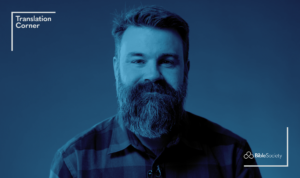The recent history of Bible Translation (over the last couple of hundred years) has been a missionary endeavour to write out Scripture in languages around the world. It’s been a task of writing, frequently involving a first task of how to write down anything in a language that prior to that point had never been written down.
Different people worked on this task at different times, resulting in all sorts of results – Indigenous languages in Australia have ended up with quite different orthographies (writing systems) because of these varying decisions. Some languages use ‘ŋ’ instead of ‘ng’; other languages use ‘ḻ’ where another uses ‘rl’; some write ‘ä’ where others write ‘aa’ or ‘a:’.
Add to that background a history of systemic oppression of language, culture, and traditional heritage, and many Indigenous people around Australia are functionally illiterate in their own language, even when they speak it fluently.
There’s been lots of interest recently in audio recordings of existing translations, as the entire community of a language can listen to a recording of the Bible, but not everyone can read a printed version.
This literacy situation also makes a traditional translation process very complicated, as it is based on reading (English) text and then writing text in a target language. Other people then read that text and check it for accuracy and naturalness.
Especially amongst groups where the total number of fluent speakers of a language might be very small, finding capable and interested people to do all this who are also literate in both English and their own language is challenging.
Enter Oral Bible translation. This process has been gaining popularity around the word in recent years, as it replaces the traditional translation process with one that is oral from start to finish.
Nothing ever need be written down in an OBT project.
There’s lots of variations in this process, but generally translators start out by listening to a passage/story/section many times. They talk about the context of the passage, the background of characters and events and setting, and so internalise that story. They know the details and events intimately.
They then practice reciting that story to team members in their target language, and workshop it as a small group to make sure that they’re getting all the detail: not adding anything in, nor leaving anything out.
A telling of that story is recorded to capture it so others can listen to it, offering any changes for content, style, vocabulary choice, and so on. (This is just like the community checking phase of a traditional project, but just done with audio files rather than pieces of paper.)
The consultant check stage is also done through audio recording – one team member will back-translate the workshopped version of the translation by speaking and recording their translation. The consultant can then check it for accuracy, ask the team questions, and help refine the translation. Any changes are re-recorded.
This process is quite technologically based – it requires a system of recording, playback, and editing to insert changes. It makes translation not only accessible as a process to those who can’t or prefer not to read and write in their language. But even more than that, the result is already an audio recording, making it easy to distribute to a group of people who are often far more ready to listen to God’s word than to read it.

Sam Freney is translation consultant with Bible Society Australia. Sam works with heart language translators across Australia with the collective goal to translate the Bible in the most accurate, clear and natural way possible.
Join as we look at all things clarity, accuracy, acceptability, and more in a general series of Bible translation tidbits from around our region.